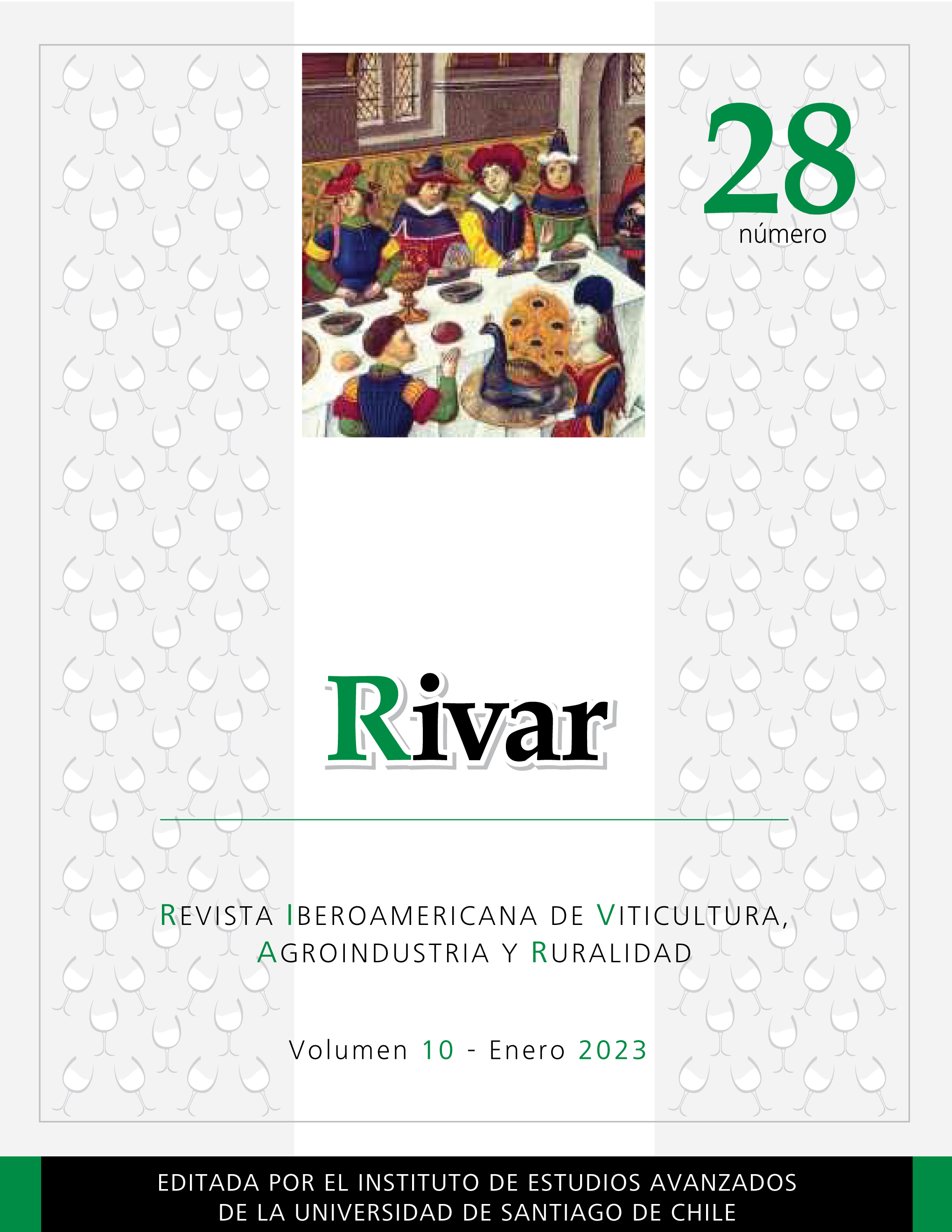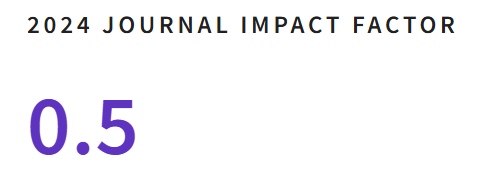Wine Consumption Reasons by Wine Tourists from Central Mexico
DOI:
https://doi.org/10.35588/rivar.v10i28.5377Keywords:
Wine, consumption, tourism, MexicoAbstract
The aim of this article was to study the factors of wine consumption in the oenological routes of Central Mexico. A questionnaire applied to 402 subjects was designed on the Cheese and Wine route, in Querétaro. It was structured in three sections, the Food Choice Questionnaire to identify the reasons for consumption, free word association and finally the sociodemographic characteristics were collected, the latter being analyzed qualitatively. With the information collected, an Exploratory Factor Analysis was carried out and subsequently a Hierarchical Cluster Analysis; as well as non-parametric tests to identify statistical differences. The words were analyzed using word clouds. Within the results twelve reasons for consumption and three groups of wine consumers were identified in Mexico in the context of wine tourism activity. It is concluded that the consumption of wine is determined and configured by the level of relationship between the consumer and the cultural reference of the drink. In addition, there is an increase in Mexican interest in consuming wine, adapting it to their socio-cultural and economic particularities.
Downloads
References
Acuti, D.; Mazzoli, V.; Grazzini, L. y Rinaldi, R. (2019). “New Patterns in Wine Consumption: The Wine by the Glass Trend”. British Food Journal 122(8): 2655-2669. DOI https://doi.org/10.1108/BFJ-04-2019-0299
Brunner, T.A. y Siegrist, M. (2011). “A Consumer-Oriented Segmentation Study in the Swiss Wine Market”. British Food Journal 113(3): 353-373. DOI https://doi.org/10.1108/00070701111116437
Bruwer, J. y McCutcheon, E. (2017). “Marketing Implications from a Behaviourism Perspective of Consumption Dynamics and Socio-Demographics of Wine Consumers”. Asia Pacific Journal of Marketing and Logistics 29(3): 519-537. DOI https://doi.org/10.1108/APJML-06-2016-0095
Celhay, F. y Remaud, H. (2018). “What Does your Wine Label Mean to Consumers? A Semiotic Investigation of Bordeaux Wine Visual Codes”. Food Quality and Preference 65(2018): 129-145. DOI https://doi.org/10.1016/j.foodqual.2017.10.020
Cidell, J. (2010). “Content Clouds as Exploratory Qualitative Data Analysis”. Area 42(4): 514-523. DOI https://doi.org/10.1111/j.1475-4762.2010.00952.x
De Jesús Contreras, D.; Thomé-Ortiz, H.; Espinoza Ortega, Á. y Vizcarra Bordi, I. (2019). “Trayectoria territorial de la región enológica de Querétaro, México (1970-2017): enoturismo y calidad territorial”. Cuadernos Geográficos 58(2): 240-261. DOI https://doi.org/10.30827/cuadgeo.v58i2.7358
De Jesús Contreras, D. y Thomé-Ortiz, H. (2021). “The Old and The New World of Wine: Rethinking Enogastronomic Tourism from Contextual Factors”. Journal of Gastronomy and Tourism 5(4): 177-193. DOI https://doi.org/https://doi.org/10.3727/216929721X16105303036544
____. (2019). “Turismo enológico y rutas del vino en México. Estado del conocimiento y análisis de casos”. Revista RIVAR 6(17): 27-44. DOI https://doi.org/10.35588/rivar.v6i17.3913
Field, A. (2009). Discovering statistics using SPSS (3°). London, SAGE Publications.
Gambaro, A. (2018). “Projective Techniques to Study Consumer Perception of Food”. Current Opinion in Food Science 21: 46-50. DOI https://doi.org/10.1016/j.cofs.2018.05.00
Ginon, E.; Ares, G.; Issanchou, S.; Laboissière, L.H.E. y Deliza, R. (2014). “Identifying Motives Underlying Wine Purchase Decisions: Results from an Exploratory Free Listing Task with Burgundy Wine Consumers”. Food Research International 62: 860-867. DOI https://doi.org/10.1016/j.foodres.2014.04.052
Gómez, M.P.; Medina, F.X. y Puyuelo, J.M. (2016). “Turismo y enogastronomía en tiempos de crisis: el caso de Aragón (España)”. PASOS Revista de Turismo y Patrimonio Cultural 14(2): 447-457. DOI https://doi.org/10.25145/j.pasos.2016.14.029
Guerrero, L.; Claret, A.; Verbeke, W.; Enderli, G.; Zakowska-Biemans, S.; Vanhonacker, F.; Issanchou, S.; Sajdakowska, M.; Granli, B.S.; Scalvedi, L.; Contel, M. y Hersleth, M. (2010). “Perception of Traditional Food Products in Six European Regions Using Free Word Association”. Food Quality and Preference 21(2): 225-233. DOI https://doi.org/10.1016/j.foodqual.2009.06.003
López, A.P. (2017). “Introducción”. En Martínez, G.C.; Román, J.J.G. y Mora, C.M.T.C. (coords.). Uvas, tierra y memoria. Coahuila, Raíz de la Vitivinicultura en América y Quintanilla Ediciones: 9-12.
López-Rosas, C.A. y Espinoza-Ortega, A. (2018). “Understanding the Motives of Consumers of Mezcal in Mexico”. British Food Journal 120(7): 1643-1656. DOI https://doi.org/10.1108/BFJ-07-2017-0381
Moore, K. (2019). “Jesuit Winemaking and Art Production in Northern New Spain”. Journal of Jesuit Studies 6(2): 294-314. DOI https://doi.org/10.1163/22141332-00602006
Novo, G.; Osorio, M. y Sotomayor, S. (2018). “Wine Tourism in Mexico: An Initial Exploration”. Anatolia 30(2): 246-257. DOI https://doi.org/10.1080/13032917.2018.1519212
Organización Internacional de la Viña y el Vino (OIV) (2021). “Statistiques”. OIV. En http://www.oiv.int/es/statistiques/recherche (consultado 10/10/2022).
____. (2016). “Statistiques”. OIV. En http://www.oiv.int/es/statistiques/recherche (consultado 10/10/2022).
Parr, W.V.; Mouret, M.; Blackmore, S.; Pelquest-Hunt, T. y Urdapilleta, I. (2011). “Representation of Complexity in Wine: Influence of Expertise”. Food Quality and Preference 22(7): 647-660. DOI https://doi.org/10.1016/j.foodqual.2011.04.005
Rojas-Rivas, E.; Espinoza-Ortega, A.; Martínez-García, C.G.; Moctezuma-Pérez, S. y Thomé-Ortiz, H. (2018). “Exploring the Perception of Mexican Urban Consumers Toward Functional Foods Using the Free Word Association Technique”. Journal of Sensory Studies 33(5): e12439. DOI https://doi.org/10.1111/joss.12439
Rojas-Rivas, E.; Espinoza-Ortega, A.; Thomé-Ortiz, H. y Cuffia, F. (2022). “More than Words! A Narrative Review of the Use of the Projective Technique of Word Association in the Studies of Food Consumer Behavior: Methodological and Theoretical Implications”. Food Research International 156: 111124. DOI https://doi.org/10.1016/j.foodres.2022.111124
Rojas-Rivas, E.; Rendón-Domínguez, A.; Felipe-Salinas, J.A. y Cuffia, F. (2020). “What is Gastronomy? An Exploratory Study of Social Representation of Gastronomy and Mexican Cuisine Among Experts and Consumers Using a Qualitative Approach”. Food Quality and Preference 83: 103930. DOI https://doi.org/10.1016/j.foodqual.2020.103930
Ross, K.C.; Clark, L.D.; Padgett, T.C. y Renckly, T.R. (2002). Air University Sampling and Surveying Handbook: Guidelines for Planning, Organizing, and Conducting Surveys. Washington DC, University Press of the Pacific.
Rössel, J. y Pape, S. (2014). “Who Has a Wine-Identity? Consumption Practices between Distinction and Democratization”. Journal of Consumer Culture 16(2): 614-632. DOI https://doi.org/10.1177/1469540514536192
Sánchez-Vega, L.P.; Amaya-Corchuelo, S. y Espinoza-Ortega, A. (2019). “Percepción de la calidad y confianza en el jamón ibérico. Perspectivas del consumidor y del vendedor”. Estudios Sociales. Revista de Alimentación Contemporánea y Desarrollo Regional 29(54): 2-28. DOI https://doi.org/https://dx.doi.org/10.24836/es.v29i54.797
Seo, Y. y Buchanan-Oliver, M. (2015). “Luxury Branding: The Industry, Trends, and Future Conceptualisations”. Asia Pacific Journal of Marketing and Logistics 27(1): 82-98. DOI https://doi.org/https://doi.org/10.1108/APJML-10-2014-0148
Sharma, P.; Singh, S. y Misra, R. (2020). “Wine-Related Lifestyle Segmentation in the Context of Urban Indian Consumers”. International Journal of Wine Business Research 32(4): 503-522. DOI https://doi.org/10.1108/IJWBR-05-2019-0036
Steptoe, A.; Pollard, T.M. y Wardle, J. (1995). “Development of a Measure of the Motives Underlying the Selection of Food: The Food Choice Questionnaire”. Appetite 25(3): 267-284. https://doi.org/10.1006/appe.1995.0061
Velikova, N.; Dodd, T.H. y Wilcox, J.B. (2013). “Meat is Male; Champagne is Female; Cheese is Unisex: An Examination of Perceived Gender Images of Wine”. En 7th AWBR International Conference. Ontario, 12-15 de junio de 2013: 1-12. DOI
https://doi.org/10.13140/2.1.2774.0160
Wolf, H.L.; Morrish, S.C. y Fountain, J. (2016). “A Conceptualization of the Perceptions and Motivators that drive luxury wine consumption". International Journal of Wine Business Research 28(2): 120-133. DOI https://doi.org/10.1108/IJWBR-09-2015-0038









